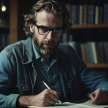What will happen after death according to 5 After Death Theories
Exploring the Beyond: A Lighthearted Adventure into Afterlife Theories. From Reincarnation to Quantum Musings, Let's Dive into the Mysteries that Have Captivated Minds Across Cultures and Time. Join Us on a Journey to Uncover the Whys and Hows of What Lies Beyond Life's Curtain.

Death, veiled in mystery and inevitability, beckons us to contemplate the unknown that lies beyond life's threshold. While answers elude us, various theories attempt to decipher the enigma of what transpires after our departure from this world. In this exploration, we'll delve into five intriguing concepts, each offering a unique perspective, spanning from mysticism to science.
1. Animal Reincarnation:
How the Idea Originated:
Picture a realm where, after death, the soul takes on the form of a reborn animal. This is the essence of animal reincarnation, deeply ingrained in Indian and Eastern religions. The belief suggests a shared soul between humans and animals, with the transition to an animal form seen as a spiritual progression. Rooted in ancient Indian and Eastern philosophies, scholars and spiritual leaders played pivotal roles in shaping this belief, embedding it within the broader context of karma and rebirth.
2. Born-Again Deja Vu:
How the Idea Originated:
Ever experienced a profound sense of déjà vu? The doctrine of reincarnation proposes life as an eternal cycle of repetition. After death, one is reborn in a new human body, devoid of memories from the past life. Advocates argue that each rebirth presents fresh opportunities to rectify past mistakes, weaving an ongoing life narrative. The theory draws inspiration from classical philosophical ideas, particularly Hinduism's concept of samsara, entwining ancient notions with modern musings on consciousness.
3. Heaven and Hell:
Embedded within the rich tapestry of Christian teachings, the concept of an afterlife unfolds as a profound narrative shaped by the dichotomy of heaven and hell. Rooted in the sacred verses of the Bible, this doctrine propounds that our earthly deeds wield the power to chart our eternal course, providing believers with a moral compass and existential framework.
Biblical Essence: Central to this belief is the conviction that passages from the Bible, especially those illuminating themes of resurrection and eternal life, form the bedrock of spiritual guidance. The scriptures act as a timeless source, urging adherents to align their actions with moral principles, influencing the trajectory of their post-mortal existence.
Divine Dichotomy: Heaven, envisioned as a celestial haven suffused with divine love and eternal communion, beckons the righteous towards virtuous living. In contrast, hell emerges as a fiery abyss—a consequence for straying from the moral path. These contrasting destinies serve not just as depictions of the afterlife but as moral motivators, steering adherents towards a life shaped by ethical choices.
Moral Pillar: More than a glimpse into the beyond, the concept of heaven and hell forms the cornerstone of a moral framework. It infuses ethical decision-making, shaping individual conduct and fostering accountability. The anticipation of heavenly reward or the fear of eternal torment becomes a driving force, inspiring believers to navigate the intricate interplay between their temporal existence and the vast expanse of the afterlife.
4. Death as an Illusion:
How the Idea Originated:
Challenging conventional wisdom, the theory of death as an illusion emerges from the realms of quantum physics and biocentrism. Supported by Dr. Robert Lanza, a scientist at Wake Forest University School of Medicine, this theory posits that death is a construct of the human mind. Biocentrism contends that life and biology shape reality, suggesting that after death, our personal world ceases to exist. Rooted in the rejection of traditional views, this concept challenges our fundamental understanding of life and death.
5. The Abyss of Nothingness:
How the Idea Originated:
In contrast to mystical beliefs, the concept of death as an end proposes absolute silence after life concludes. Rejecting notions of an afterlife, rebirth, or heavenly realms, it envisions death as eternal emptiness, devoid of consciousness and familiar existence. While not attributed to a specific individual, this perspective encapsulates a worldview rooted in a concern for life's impermanence and a lack of empirical evidence supporting an afterlife.
The myriad theories surrounding life after death span from the spiritual to the scientific, captivating the human imagination. Whether finding solace in reincarnation, envisioning an eternal afterlife, or contemplating death as an illusion, the mystery persists. These musings navigate the complexities of life, reminding us that the transcendent mysteries are as diverse as the myriad experiences of real life.
About the Creator
Morgan Everly
Meet Morgan Everly, a writer who loves exploring everything from science to economics and crafting captivating stories. Join me on a journey through a world of diverse interests and engaging narratives.






Comments (1)
Thumbs up for your effort! Keep up the outstanding work